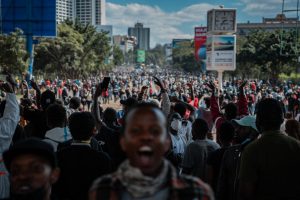When Tanzania achieved independence in 1961, Julius Nyerere’s vision of Ujamaa offered one of Africa’s most coherent experiments in moral nation building. Peace, in Nyerere’s conception, was not merely the absence of violence but a moral order founded on equality, participation, and social justice (Nyerere, 1968). More than six decades later, the same country that once embodied post-colonial idealism now faces growing civic unrest. As Tanzanians went to the polls in October 2025, protests erupted across Dodoma, Dar es Salaam, Arusha, and Mwanza, led largely by young people who demanded transparency and inclusion. In response, the State imposed curfews and restricted internet access, citing the need for national stability. What emerges is a striking paradox: a nation celebrated for its peace is increasingly reliant on coercion to sustain it.
Understanding this transformation requires tracing the genealogy of Tanzania’s political order. Under Nyerere, Ujamaa (African socialism) fused communitarian ethics with developmental nationalism. The one-party structure of the 1960s was justified as a mechanism for unity, an antidote to ethnic fragmentation and the perceived threat of Western imperialism (Hyden, 1980). The ruling party, first TANU and later Chama Cha Mapinduzi (CCM), became both the State’s moral compass and its political gatekeeper. Over time, however, consensus hardened into control. By the late 1980s, when economic stagnation and structural adjustment forced liberalization, Tanzania adopted multiparty politics without dismantling the deeper authoritarian logic of party supremacy. Scholars have since described this phenomenon as “dominant-party democracy” (Morse, 2018) or “competitive authoritarianism” (Levitsky & Way, 2010): formal pluralism operating within informal constraints.
Contemporary Tanzania’s crisis of civic renewal grows from this institutional soil. The CCM’s uninterrupted rule for over six decades has produced both stability and stagnation. Its political legitimacy, once derived from liberation and unity, has become rooted instead in bureaucratic continuity and moral paternalism. As Issa Shivji (1990) argued, Tanzania’s post-colonial State replaced the emancipatory ambitions of anti-colonial struggle with “the moral economy of obedience.” In the present, this economy persists through the rhetoric of amani (peace) and utulivu (stability), even as public participation narrows. The October 2025 elections exemplified this continuity: opposition leaders were detained, civic rallies banned, and youth protests suppressed (Amnesty International, 2025). The ruling elite continues to portray itself as the custodian of peace while equating dissent with disorder.
Yet this version of peace is increasingly questioned by the generation born long after Nyerere’s era. Youth constitute nearly two-thirds of Tanzania’s population; for them, the historic legitimacy of CCM holds little emotional weight. Their political experience is defined by unemployment, economic precarity, and limited participation in State institutions. The government’s infrastructure-led development model, railways, ports, and digitalization, projects modernity but leaves civic voice underdeveloped. As a result, young Tanzanians are turning toward informal and digital spaces to articulate grievances. The circulation of slogans such as “Wingi wetu ndiyo ukombozi” (“Our numbers are our liberation”) and “Take charge of your future” reflects not only frustration but also a redefinition of agency. These expressions recall what Mahmood Mamdani (1996) termed the “politics of survival”: a contest between rulers and ruled over who defines the meaning of citizenship in the post-colonial state.
The historical irony is profound. Nyerere’s Ujamaa sought to fuse peace with equality, but its institutional legacy, centralized control, and moral authority have evolved into a technocratic authoritarianism. Today’s leaders invoke Nyerere’s name to legitimize continuity, even as they hollow out the participatory spirit he once championed. What has survived is not the egalitarian ethos of Ujamaa, but its disciplinary infrastructure. Where Nyerere preached dialogue, the modern State practices discipline; where he envisioned solidarity, it enforces silence. This evolution marks what can be called the bureaucratization of peace, a shift from peace as moral dialogue to peace as managerial control.
In this context, Tanzania’s youth movements represent a potential re-awakening of civic peacebuilding. In earlier reflections on this platform, The Rising Generation: Read it here https://www.kumartinez.com/the-rising-generation-youth-movements-between-democratic-renewal-and-political-rupture/ and From Resistance to Reconciliation: Available to read here: From Resistance to Reconciliation: Rise of Youth Movements and the Transformation of Civic Peacebuilding in Contemporary Post-Conflict Africa – kumartinez.com, I explored how youth activism across Africa is transforming from protest into a search for moral legitimacy. Tanzania provides a vivid extension of that argument. Here, the contest is not for State capture but for the moral redefinition of peace itself. By mobilizing around digital rights, climate justice, and accountability, young Tanzanians are performing what John Paul Lederach (1997) would call “conflict transformation”: the slow reconfiguration of social relationships from domination to participation. Their actions echo youth-led awakenings in Kenya, Senegal, and Madagascar, where civic agency is becoming the most dynamic form of political renewal.

Street Demonstrations are emerging as new civic frontiers for Tanzania’s youth. Photo: Pexels (CC0).
However, the Tanzanian regime’s response illustrates the perils of civic awakening under dominant-party systems. Restrictions on opposition rallies, arrests of activists, and periodic internet shutdowns (Freedom House, 2025) demonstrate the narrowing of public space. The State’s reliance on “peace rhetoric” to suppress dissent mirrors broader African patterns of what Achille Mbembe (2001) describes as necropolitics: the power to define whose voice counts as legitimate and whose silence constitutes order. Tanzania’s model of peace without participation thus risks producing precisely what it seeks to avoid: the alienation of its youth and the moral decay of its governance legitimacy.
For all its challenges, Tanzania remains a society where civic resistance still frames itself in moral rather than violent terms. Youth activists continue to appeal to Nyerere’s ethical legacy, not to reject it but to reclaim it. This is where Tanzania’s story diverges from trajectories that are more repressive. Even under constraint, its civic tradition has not been extinguished; it has merely migrated into new forms of expression, social media campaigns, community volunteerism, and issue-based advocacy. These emerging spaces mark the beginnings of what may become a new phase of post-liberation civic renewal: peace reconstructed from below, not decreed from above.
The central question now is whether Tanzania’s leadership will recognize this transformation as an opportunity or a threat. If it engages constructively with youth activism, through genuine dialogue, legal reforms, and respect for association, it could revitalize the moral foundations of its governance. If it persists in conflating stability with control, it risks undermining the very peace that has long defined its national identity. The ghosts of Ujamaa still haunt Tanzania’s corridors of power, but they also inspire those who march for accountability and freedom.
Ultimately, the legacy of Nyerere’s peace will not be measured by the absence of conflict but by the presence of civic courage. The generation rising today embodies that courage, navigating the fine line between loyalty to the national narrative and disillusionment with its institutions. Their mobilization signals that Africa’s most celebrated “stable democracy” may yet undergo its most profound transformation, from a politics of obedience to a politics of participation. The question that remains, as protests and digital activism grow, is simple but decisive: will Tanzania’s next decade witness renewed youth mobilization as the moral engine of reform, or the silencing of a generation that dares to imagine peace beyond control?
Disclaimer
This reflection is written solely for academic and analytical purposes. It does not express support for, nor opposition to, any government, political party, or institution mentioned. The arguments presented aim to foster scholarly discussion on governance, peacebuilding, and youth civic participation in Africa. All interpretations are grounded in publicly available sources and theoretical frameworks relevant to the field of Peace and Conflict Studies.
“Without freedom, we have no peace; and without participation, we have no freedom.”
— Julius K. Nyerere, Ujamaa: Essays on Socialism (1968)

